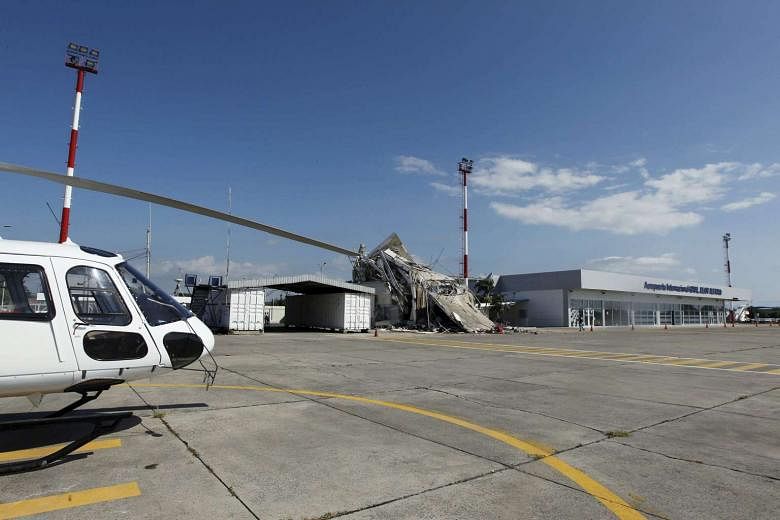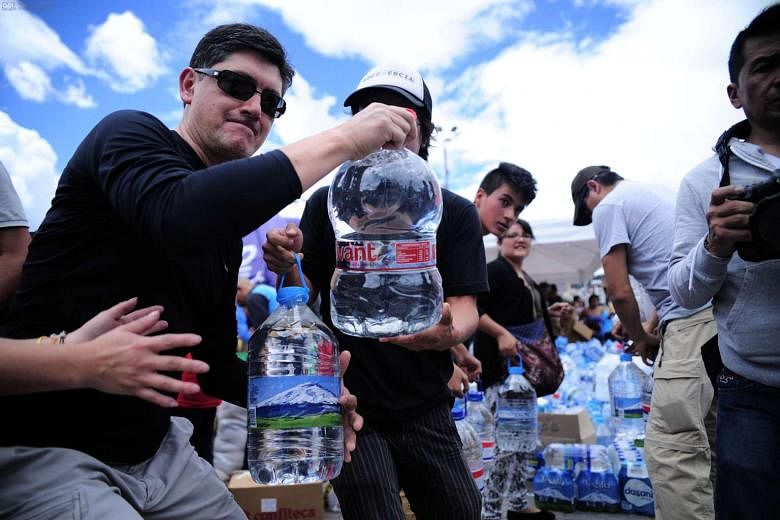PEDERNALES, Ecuador (REUTERS) - Traumatised Ecuadoreans slept amid rubble while rescuers dug for survivors on Monday (April 18) after an earthquake smashed the Andean nation's coastal region, killing at least 272 people and flattening resort towns.
Saturday's 7.8 magnitude quake ripped apart buildings and roads, knocked out power, and injured at least 2,068 people in the largely poor Andean country.
In the devastated beach town of Pedernales, shaken survivors curled up for the night on mattresses or plastic chairs next to the rubble of their homes. Soldiers and police patrolled the hot, dark streets while pockets of rescue workers plowed on.
Late on Sunday, firefighters entered a partially destroyed house to search for three children and a man apparently trapped inside, as a crowd of 40 gathered in the darkness to watch.
"My little cousins are inside, before there were noises, screams. We must find them," pleaded Isaac, 18, as the firemen combed the debris.
Tents sprung up in the town's still-intact stadium to store bodies, treat the injured, and distribute water, food, and blankets to survivors.
People wandered around with bruised limbs and bandaged cuts, while patients with more serious injuries were evacuated to hospitals.
Leftist President Rafael Correa, who cut short a visit to Italy, surveyed the damage in the coastal province of Manabi on Sunday night.
"Ecuador has been hit tremendously hard," Mr Correa said in a televised address, his voice breaking as he said he feared the death toll would rise from what he called a tragedy.
While the full extent of the damage remains unclear, the disaster will likely worsen the OPEC nation's economic performance this year.
The small, oil-dependent country has already been battered by the tumble in crude prices.
Its crucial energy industry appears largely intact after the quake, though its main refinery of Esmeraldas was closed as a precaution. However, exports of bananas, flowers, cacao, and fish could be slowed by ruined roads and delays at ports.
The quake could also alter political dynamics ahead of next year's presidential election.
AFTERSHOCKS
About 230 aftershocks have rattled survivors, who huddled in the streets, worried that the flow of tremors could topple their already cracked homes.
"We're scared of being in the house," said survivor Yamil Faran, 47, surrounded by some 30 people in the middle of a street in the city of Portoviejo. "When this improves and the aftershocks stop, we're going to see if we can repair it."
Some 130 inmates in Portoviejo took advantage of the quake's destruction and chaos to climb over the collapsed walls of the low-security El Rodeo prison. More than 35 prisoners had been recaptured, authorities said on Sunday night.
About 13,500 security personnel were mobilised to keep order. Beyond a handful of unconfirmed reports of theft and looting, the country appeared calm.
Some US$600 million (S$814 million) in credit from multilateral lenders was immediately activated for the emergency, the government said.
Domestic aid funds were being set up and Venezuela, Chile and Mexico were sending personnel and supplies. The Ecuadorean Red Cross mobilised more than 800 volunteers and staff and medical charity Medecins Sans Frontieres said it was sending a team from Colombia.
Two Canadians were among the dead. Ms Jennifer Mawn, 38, and her 12-year-old son Arthur, died when the roof of their coastal residence collapsed.
Residents on the Galapagos islands far off Ecuador's coast and home to numerous rare species, said they had not been affected.
The tremor followed two large and deadly quakes that struck Japan since Thursday.
Both countries are located on the seismically active "Ring of Fire" that circles the Pacific, but according to the US Geological Survey, large quakes separated by such distances would probably not be related.










